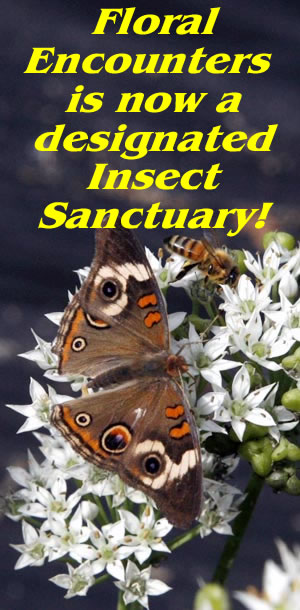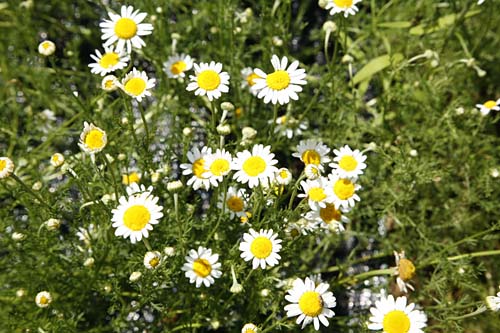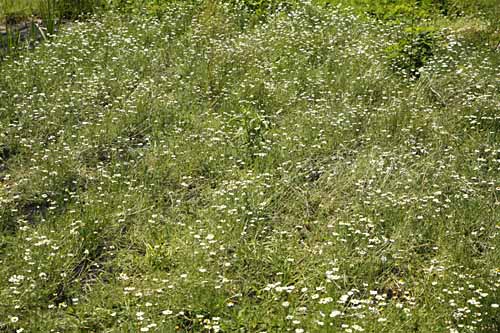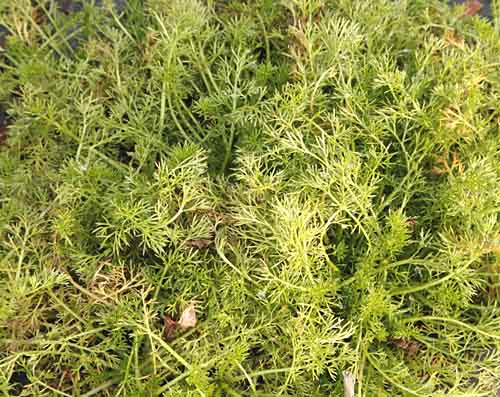This is true chamomile which should not be confused with German chamomile that
is also used in herbal preparations.
Roman chamomile is a low growing evergreen perennial. It can be used as a ground
cover, prefers full sun to very partial shade on well drained soils. These can
be poor and it needs little water once established, however if you intend to
harvest the flowers extra water is suggested. Roman chamomile does not tolerate
hot dry weather well, it may grow but it will be straggly. Both the flowers
and the foliage of this chamomile are scented with the characteristic apple
aroma, it is an easy plant to grow and deer don't seem to eat it.
Description.
A perennial herb with short much branched creeping rhizomes. In most cases it
is evergreen, at least to zone 6 and 5. It ranges from 4 to 12 inches (10-30
cm) in height. It has finely divided pinnate leaves with inrolled margins arranged
alternately on hairy stems. The apple to mid green leaves give the whole plant
a delicate feathery appearance. Flowers arise from mid spring to mid summer
depending on your zone, with the major blooming in early to mid spring (in zone
6) but other flowers being produced throughout the year. Each flower is born
solitarily on the end of a longer stem. They have conical solid yellow centers
surrounded by white ray florettes and look very daisy like. There are some eighteen
white rays arranged round a conical centre, botanically known as the receptacle,
on which the yellow, tubular florets are placed- which is much more conical
than that of a true daisy. Roman chamomile flowers are less prolific than those
of German chamomile (Scented Mayweed) but they are considerably larger so less
are required to make herbal preparations.
The plant increases in size from a central mass in early to mid spring with
a burst of growth that tends to slow as the season progresses.
Growing.
Chamomile seeds need light to germinate so never cover the seed. Roman chamomile
is best started indoors and potted to grow reasonable sized plants before placing
in the garden. Once established chamomile is very tough plant and can take some
foot traffic giving off a pleasant aroma with each step. It is not however hardy
enough for a lot of traffic. This variety of roman chamomile is also not suitable
for lawns (for this purpose the non flowering but still aromatic Trenague variety
is used which can only be propagated from cuttings.)
Roman chamomile is very tough and needs little maintenance once established.
It will continue to grow out from a central core spreading its rhizome further
each year. In cooler areas it may produce a good ground cover but it cannot
tolerate hot dry weather. In zone 6 the plants grow well proliferate but they
don't beat out the weeds which grow between the creeping rhizomes. In most cases
a chamomile bed will need hand weeding each year, usually several times per
season.
Location.
Roman chamomile prefers a sunny location full sun is ideal but it can tolerate
some morning or afternoon shade. For maximum flower production a well drained
soil with a good component of organic material and fertilizer is essential.
The plant will grown well on poor soils and even slightly higher acidity but
it will not produce as many flowers. Do not plant in waterlogged or heavy clay
soils without serious soil amendment. Once established the plants will need
to be weeded as they don't seem able to beat out the weeds.
Harvesting.
Flowers should be snipped from the plant when they are in full bloom. This can
be done using a pair of snips, scissors or for larger areas a chamomile rake
can be used. Chamomile rakes are box like contraptions with tines. The rake
is slide around the flower and the pulled upwards to snap the flowers from the
plant. Although this does make the job easier care must be taken to hold the
plant from below to prevent it from being pulled from the ground. Using the
rake to vigorously causes the flower heads to catapult out of the rake bed and
onto the ground.
Flowers can then either be sun dried or dried in a dehydrator. Be aware that
if you are intending to grow for use a herbal tea you need a LOT of plants to
produce only a small amount of flowers for tea. Dried flowers are small and
take up little space. If you drink a lot of herbal tea you will need quite a
large chamomile bed to sustain you.
Warning.
There are many plants that look similar to chamomile. If harvesting in the wild
(or from migrating seeds in your garden) make sure that the plant you have really
is chamomile. Few others have the same distinctive aroma and the leaves are
characteristic but the flowers can be very similar in many species some of which
can be dangerous if taken in larger doses so always make sure you have the correct
plant.
Other names
ground apple, earth apple, chamomile, English chamomile, garden chamomile, lawn
chamomile, manzanilla, noble chamomile, Russian chamomile and white chamomile








